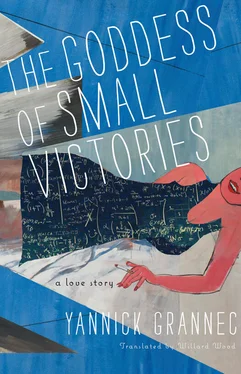“I’ll leave you to rest.”
“Talking about love, young lady, when are you taking me to the cinema to see some bright bit of fluff?”
“The administration will never allow it.”
“I have lived through two wars. Out of the question that I should tremble in front of a white coat! Figure something out. Look upon it as a therapeutic exercise. Don’t run away from a fight, my sweet. Wherever you go, you always lug your bags along with you. I’ll embroider that for you as a Christmas gift.”
30. 1946: Ambulatory Digressions Going
I go to my office only in order to have the privilege of walking home with Kurt Gödel.
— Albert Einstein
When his watch showed nine o’clock sharp, Kurt rang the bell at 112 Mercer Street. The Princeton address best known to the town’s taxi drivers adorned the front of a small neo-Victorian house with white siding, extremely modest given the planetary fame of its owner. I waited behind the box hedge separating the street from the front yard. A crazy head of hair poked out from a second-floor window. A few minutes later, Albert Einstein appeared. He wore an old sweater over baggy pants and his usual leather sandals and mismatched socks. His secretary caught up with him at the door.
“Professor, your briefcase! One day you’ll forget your own head!”
“What would I do without you, dear Helen?”
“I’ve organized your most important mail into two folders. One is marked “Late,” the other “Too Late.” Which doesn’t mean you can’t answer it. And don’t deliberately forget your lunch with the reporter!”
“Good God, Dukas! You’re supposed to protect me from this sort of bloodsucker!”
“Not this one. He’s from the New York Times . We’ll expect you here at one o’clock.”
“Gödel, you’ll join us, of course?”
“I think not, I eat too much already, thanks to Adele. The less I eat, the better I feel.”
“Dear friend, there are limits to everything! Dukas, tell the cook to set an extra place.”
Turning around, he caught sight of me. “Adele! To what do I owe the honor of this unaccustomed visit?”
“I’m walking to the Institute with you this morning. I have to straighten out some administrative issues. The damn bureaucrats are driving me bananas.”
“Your trip to Europe is coming along?”
Kurt opened the gate; he was eager to start walking.
“If my wife continues to insult the staff at the Institute, I doubt she’ll ever set off.”
“You’ve never had to deal with this kind of headache. You don’t know just how exasperating it can be.”
Einstein patted his pockets in a gesture I afterward recognized. He was looking for his pipe.
“Bureaucracy brings death to every action.”
“But Adele’s shouting could awaken the dead!”
“Are you experimenting with humor, Gödel?”
“He got out of bed on the right side today.”
“Stability is good for you. You’re a permanent member now! You can look at the future with more assurance.”
“If Adele would only let me work in peace.”
“Stop complaining! You’ll have all the peace in the world if I ever manage to leave!”
Since Germany’s surrender, I had been galvanized by the prospect of returning to Europe. We had received news of the Gödel family in June 1945, and of mine only much later. Marianne and Rudolf had both survived the bombings, she in Brno, he in Vienna. Redlich, who was Kurt’s godfather, died in the gas chambers. I’d heard that my father died. I’d heard that my sister died. I folded the pain away deep inside me next to my old memories, the whole under the warm coverlet of my guilt as a survivor. I’d had time during the long years of silence to imagine the worst. And the worst had happened. My mother, left all alone, had fallen on hard times. The few letters she sent describing her privations were blackened by the censors. I mailed her small amounts of money as soon as I had any. I was doing everything I could to arrange a trip to Vienna to bring her help. But after the uncertainty, the sad news had left me riddled with anxiety. I was still recovering from an appendectomy and in a pitiful state: I’d lost weight, my teeth were working loose, and my hair was falling out in handfuls. I transferred my anxieties to the American bureaucrats who were doing their darnedest to complicate my life. Meanwhile, Kurt continued imperturbably in his routine.
His recent appointment gave us a bit of breathing room. The Institute had finally named him to a permanent position with an annual salary of $6,000. 19He also had a guaranteed retirement pension of $1,500 in case of medical impairment or an inability to work. It was a lifeline and we grabbed it, but our financial security was entirely relative: in 1946, a gallon of milk cost 70¢ and a stamp 3¢. The pension was primarily an indication that the Institute had doubts about Kurt’s ability to work in the long run. Dropping the title of “Professor” suited him perfectly.
“Morgenstern thinks it would be a good idea for you to start teaching again. When I’m away, you won’t see anyone.”
“I’ll look after him, Adele. You don’t have to worry.”
“I’m big enough to look after myself!”
Albert and I exchanged knowing glances. He smiled reassuringly.
“Let’s go! I’ve got correspondence that’s apocalyptically late, and this blasted reporter plans to deprive me of my nap. Maybe before dinner I’ll find the time to do a little physics!”
We walked briskly down Mercer Street. The stroll between tree-shaded houses was pleasant on this early autumn day. The two of them followed the same route every morning at the same time. What had begun as a relationship between brilliant colleagues had become, four years later, a necessary friendship anchored in routine. Kurt rose late from bed, took his temperature, and wrote it down in a little notebook. He swallowed an assortment of pills, sipped weak coffee, then brushed his clothes. He shined his shoes and finally dressed so as to arrive exactly on time at Herr Einstein’s door. They returned together, sometimes for lunch, but most often after the sacrosanct afternoon tea at the Institute. I respected this protocol: it smoothed the jagged edges of my man’s fragile state of mind.
Our feet rustled through the sumptuous covering of red leaves on the sidewalk. Princeton was a town made for autumn, a town for taking good postprandial walks. Neither man said anything: my presence inhibited their intellectual gymnastics. Albert adroitly set himself to include me in the conversation.
“Have you recovered from your fright, Adele? Will you let me take you sailing a second time?”
“Herr Einstein, although I have every respect for you … never again! I was far too terrified!”
“And yet you’re always so intrepid.”
“But not suicidal. I have never learned to swim.”
“I never did either. A turn on this puny lake, it’s not like rounding Cape Horn!”
We had accepted an invitation the previous Sunday to go for a sail. We had heard many stories of all the times the great man had capsized. Despite his timidity, my husband had not dared refuse. We boarded and took our places, reassured to see the lake looking peaceful. The two men had quickly become embroiled in a lively discussion. I relaxed, floating on the quiet water, warming my face in the serene autumn sun. Suddenly, half asleep, I saw a shadow: a boat was bearing down on us at high speed. Albert seemed not to have noticed it. I yelled, “ Achtung! ” He veered at the last moment. Kurt, his face bloodless, clung to the gunwale, while the older man laughed like a child.
“That evening after the incident, my ulcer flared up horribly. By the way, Adele, remember to buy me a new supply of milk of magnesia when you get home. I’m almost out.”
Читать дальше












